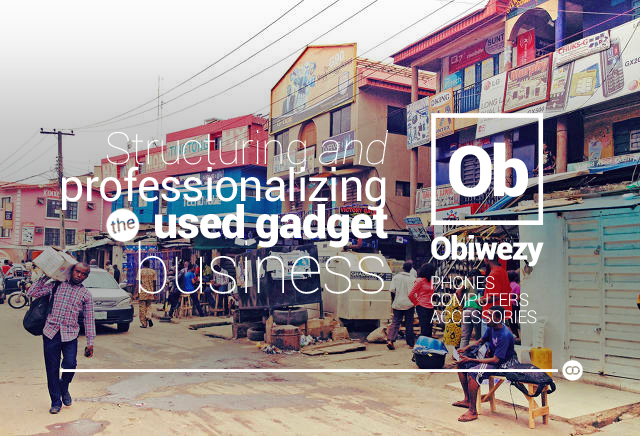Nigerian startup Obiwezy aims to professionalise the used gadget market, and create an online shopping brand that Nigerians can trust and rely on – something co-founder Ajibade Oluwatosin says the early players have failed to do.
Obiwezy is an e-commerce store specialising in used mobile devices, sourced from partner organisations as well as “swap-ins” from the public. The startup’s team checks and reconditions the devices posted for sale, and offers a warranty for every device sold on the platform.
In an interview with Disrupt Africa, Oluwatosin said the demand for second-hand devices in Nigeria is extensive, however existing players offer no guarantee of quality making the market unreliable.
“Nigerians want the latest mobile phones both for functionality and trend since mobile phones now also represent status symbol, however, they are limited by high cost of procurement, hence they tend to go-in for used devices via the popular brick and mortar marketplace or listing websites like olx, Kaymu, etc.,” Oluwatosin said.
“However there is no assurance on the source and condition of these used devices procured at any of these marketplaces, moreover no one offers warranty or after-sale services,” he said.
“Obiwezy ensures that used device procurement is safe and seamless, by ensuring quality, offering a wide range of products to customers, and also providing warranty and after-sale support via a seamless online purchase which when completed, is fulfilled by doorstep delivery or delivery pick-up centers.”
According to Oluwatosin, early market players have created an environment of distrust of e-commerce by providing sub-par services to consumers; causing the key current challenge to startups such as Obiwezy to be overcoming this pre-ingrained distrust, through mechanisms such as pay-on-delivery.
“The online business in Nigeria is still marred by distrust due to the fact that the early starters and market leaders have over time provided customers with reasons to distrust e-commerce due to non-delivery, sub standard product delivery, etc.,” Oluwatosin said.
“Hence, payment on delivery accounts for a huge percentage of transactions thus we still operate an offline system as against straight e-commerce model. Our logistics system is also a mess, and every e-commerce business has to look to ensuring a proper and efficient logistics solution.”
Despite the difficulties, Obiwezy is gaining traction, with the startup seeing revenues of US$50,000 per month, with Oluwatosin highlighting that this figure is based entirely on referrals, with marketing efforts yet to begin.
Obiwezy has grand plans for the coming years, with Oluwatosin saying the startup might even look into launching it’s own branded devices in due course.
“In the next one year our focus is to build capacity both in human resource, internal and external processes, quality assurance and fulfillment. Our goal is to build a trusted and efficient brand Nigerians can rely on. We know that the market is unquestionable, hence we want to be over qualified to fulfill our customer needs,” Oluwatosin said.
The startup also plans to extend the number of swap-centers it operates around Lagos, and approach further network operators with Obiwezy’s specialized corporate swap services.
“Since we identify that information is key to our society, and this information is readily available on the internet, it is our chief aim to make sure that quality smartphones are available to Nigerians at affordable prices,” Oluwatosin said.
“This might lead us to a possible merger with a pre-existing phone manufacturer or we might decide to produce our own range of top quality Obiwezy smartphones, that are not only affordable for the average Nigerian, but meet all quality and user interface specifications as provided worldwide!”


